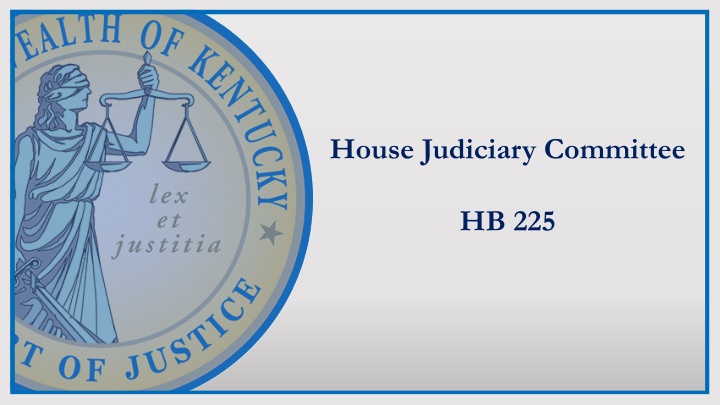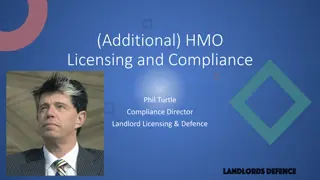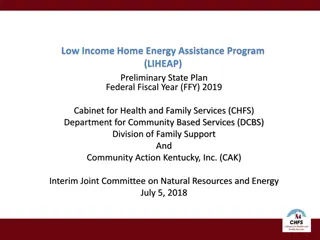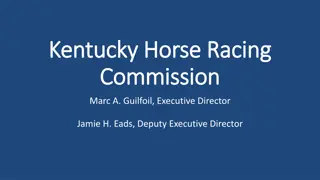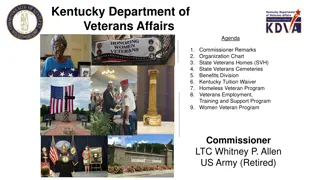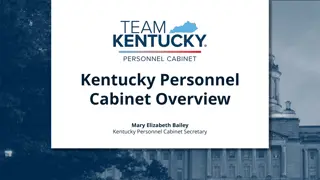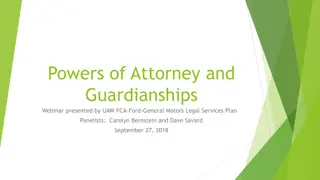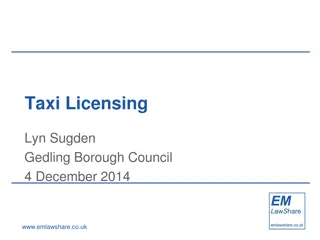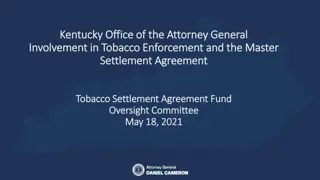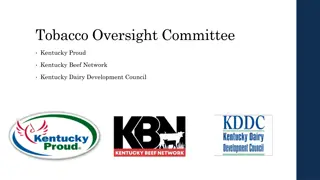Evolution of Attorney Licensing in Kentucky
The evolution of attorney licensing in Kentucky spans from the General Assembly's oversight in the 18th century to the Supreme Court's exclusive authority granted by the state constitution in 1976. This transition saw the Supreme Court overseeing admission to the Bar and disciplinary actions, rendering previous legislative authorizations obsolete. The Kentucky Bar Association now operates as an independent agency under the Supreme Court, managing attorney licensing, complaints investigation, disciplinary actions, legal education programs, lawyer assistance, and client security funds.
Download Presentation

Please find below an Image/Link to download the presentation.
The content on the website is provided AS IS for your information and personal use only. It may not be sold, licensed, or shared on other websites without obtaining consent from the author.If you encounter any issues during the download, it is possible that the publisher has removed the file from their server.
You are allowed to download the files provided on this website for personal or commercial use, subject to the condition that they are used lawfully. All files are the property of their respective owners.
The content on the website is provided AS IS for your information and personal use only. It may not be sold, licensed, or shared on other websites without obtaining consent from the author.
E N D
Presentation Transcript
House Judiciary Committee HB 225
KRS 21A.160: Unconstitutional and Void Since 1980 Ex parte Auditor of Public Accounts, 609 S.W.2d 682 (Ky. 1980): Whatever authority the court had possessed theretofore by statute with regard to admission to practice and regulation of the legal profession was superseded by Const. Sec. 116 as amended in 1975, the concluding sentence of which reads as follows: The Supreme Court shall, by rule, govern admission to the Bar and the discipline of members of the Bar. There can be no doubt that this constitutional amendment completely removed the subject from any legislative authority and rendered obsolete and ineffective the statutes pertaining to it. Strangely, nevertheless, at its 1976 regular session the General Assembly reenacted provisions authorizing the Supreme Court to appoint a board of bar examiners and to organize and govern the bar, and again requiring that admission fees be remitted to the state treasury. Ch. 58, Acts of 1976; KRS 21A.130, 21A.150, 21A.160, 21A.140. These statutory provisions are void because they purport to erect powers and limitations that no longer fall within the legislative province.
Kentucky Constitution Section 116 (1976): In 1974, the General Assembly proposed to formally cede the power to license attorneys to the Kentucky s highest court. 1974 Ky. Acts ch. 84, 1: 116. The Supreme Court shall have the power to prescribe . . . rules of practice and procedure for the Court of Justice. The Supreme Court shall, by rule, govern admission to the bar and the discipline of members of the bar.
Kentuckys History of Attorney Licensing From 1797 to 1976, the General Assembly provided for the licensing of attorneys, by enacting requirements for license, such as age, character, legal knowledge, and lack of felony conviction. In each enactment, courts of the Commonwealth were given authority over character and legal knowledge. 1797: Act of Dec. 13, 1796, 1 Litt. 365 (effective Mar. 1, 1797); 1852: Rev. Stat. ch. IV, Art. 1, 1-5; 1899: Ky. Stat. ch. 8, art. 1, 97-99; In 1918, the Court of Appeals role was formalized in setting qualifications to practice law, as to both character and legal knowledge, and established the Board of Bar Examiners, under the Court s authority. 1918 Ky. Acts, ch. 131, 1-7. In 1934, the General Assembly established the Ky. Bar Association as a judicial branch agency. 1934 Ky. Acts ch 3, 1.
What does the Kentucky Bar Association do? Serve as an independent agency of the Supreme Court with authority derived by the Kentucky Constitution and delegated through rules adopted by the Supreme Court. Maintain a roster of licensed attorneys and collect annual dues established by the Supreme Court. Investigate complaints and discipline members of the bar through the Office of Bar Counsel. Administer and regulate all continuing legal education programs and activities through the Continuing Legal Education Commission, including free CLE programs for lawyers across the Commonwealth through the Kentucky Law Update and other organizations. Provide assistance to lawyers and judges with impairment issues through the Kentucky Lawyer Assistance Program. Maintain a Clients Security Fund to provide restitution to clients who have lost money because of the unethical conduct of a licensed attorney. Maintain the Kentucky Interest on Lawyer Trust Account (IOLTA) Fund.
What can mandatory bars, including the Kentucky Bar Association, NOT do? Take ideological or political positions. See Keller v. State Bar of California, 496 U.S. 1 (1990). Lobby.
Limitation on use of Dues Current KBA Policy Dues paid pursuant to Supreme Court Order will be used by the KBA for those activities and purposes that are necessary or reasonably incurred for the purpose of fulfilling the mission established by the Court; regulating the legal profession, and improving the quality of legal services. Such dues will not be used for political or ideological activities that could reasonably be construed to impinge on the First Amendment rights of free speech of members who disagree with such political or ideological activities. In the event a particular activity that uses compulsory dues is claimed to impinge upon such constitutional rights of the members, the Board will comply with the procedures and requirements set forth in Keller v. State Bar of California, 496 U.S. 1 (1990), and will refund to the member, or permit the member to withhold, a proportionate amount as may have been expended.
Mandatory/Integrated State Bars (32) Alabama Florida Louisiana Nevada Oklahoma Texas Wisconsin Alaska Georgia Michigan New Hampshire Oregon Utah Wyoming Arizona Hawaii Mississippi New Mexico Rhode Island Virginia California Idaho Missouri North Carolina North Dakota South Carolina Washington D.C. Kentucky Montana South Dakota West Virginia
No Mandatory State Bar/Mandatory Licensing through Supreme Court or Executive Branch Licensing Structure (18) Arkansas Illinois Maine New Jersey Tennessee Colorado Indiana Maryland New York Vermont Connecticut Iowa Massachusetts Ohio Delaware Kansas Minnesota Pennsylvania Source: Kentucky Personnel Cabinet. Open Records Request 2022-113. July 19, 2022.
Dues/Fees in Kentucky and Surrounding States State Illinois Indiana Kentucky* Missouri* Ohio Tennessee Virginia* West Virginia* Fees/Dues (experienced atty) $385 $180 $310 $410 $350 biennially $170 (+$400 professional privilege tax) $250 $250 *Mandatory/integrated bar
All Federal Lawsuits Challenging Mandatory Bar Membership Have Failed Washington North Dakota Oregon Eugster v. Washington State Bar Fleck v. Wetch Gruber v. Oregon State Bar Crowe v. Oregon State Bar File closed. Certiorari denied. Certiorari denied. U.S. District Court for the District of Oregon; all claims dismissed. Certiorari denied. Certiorari denied. Case remanded to district court. Certiorari denied. Certiorari denied. 5th Circuit; all claims dismissed with prejudice. Certiorari denied. U.S. District Court for the District of Utah; all claims dismissed. Texas Oklahoma McDonald v. Firth Schell v. Oklahoma Supreme Court Wisconsin Jarchow v. State Bar of Wisconsin File v. Martin Bordeaux v. Louisiana State Bar Association Louisiana Michigan Utah Taylor v. State Bar of Michigan Pomeroy v. Utah State Bar
